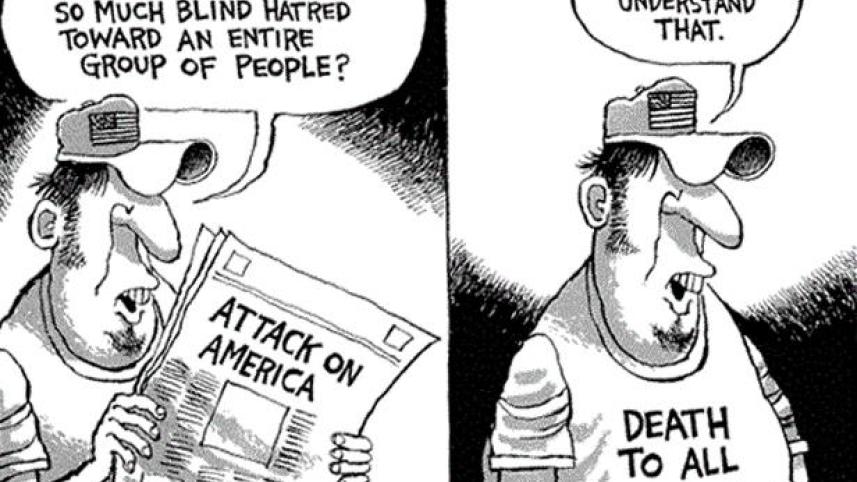An ill wind of intolerance buffets the world

When US President Donald Trump threatened to ban Muslims during his campaign last year, many people were appalled but few took the threat seriously. It's like the curses of the three witches in Shakespeare's Macbeth. Dire predictions, seemingly impossible when pronounced, come to pass in all its ghastly awfulness later on.
Trump targeted seven Muslim-majority countries – and it has been pandemonium ever since. Refugees have been caught in a limbo, the acting US attorney general has been fired for refusing to uphold the draconian law, and spontaneous protests have erupted all over the US.
The people who are among the happiest surely include the murderous thugs of the Islamic State. This is a propaganda bonanza for them.
The past few years have been a roller coaster ride for the world. Two developments in particular – the post-Iraq war mess in the Middle East followed by the exodus from Syria, and the economic meltdown in the Eurozone – have sparked deep political and economic angst, always a fertile ground for xenophobia and intolerance.
In the United States, it has led to the victory of Trump's appalling race-baiting campaign. Far-right, often openly xenophobic, parties have come to power in Hungary and Poland. They are flexing their muscles in Greece, France, Germany and the Netherlands.
Meanwhile in the Middle East, the US-led illegitimate occupation of Iraq has led to a horrendous unravelling of the nation states, and murderous, obscurant bigots have stepped into the political vacuum to create the Islamic State.
A point that cannot be emphasised enough is that the overwhelming majority of the billion-plus Muslims of the world reject the mindless doctrine of the Islamic State. They have also been its first victims. The rise of the Islamic State is arguably the single most serious threat to plural, democratic Muslim societies around the world, in addition to posing a threat to the world in general. The tendency of Islamophobic Western commentators to conflate the wider Muslim world with the Islamic State miss this point: The vast, overwhelming majority of Muslims, whatever their many shortcomings, believe in democracy, the rule of law and some degree of tolerance of diverse views and faiths.
Groups like Al Qaeda and Islamic State have caused grievous damage to Muslims by creating an atmosphere of hostility, suspicion and animus towards Muslims who live in and travel to non-Muslim countries, especially in Europe and North America. This is by conscious design. The goal is to cleave a sharper divide between Muslims and non-Muslims everywhere and hasten what US political scientist Samuel Huntington had predicted to be a clash of civilisations. Now Trump's actions are playing right into its hands.
Sorry, Mr. Huntingdon, I don't buy it, despite Trump's antics. We live in an increasingly mixed-up, globalised world. It's a world where many Western countries are more diverse with substantial Muslim populations. Many of the oil-rich Arab states, while are almost entirely Muslim, depend heavily on the expertise and labour of a population that belongs to diverse faiths. A clash of civilisations would tear up the world.
Even in a world where Trump wins elections with xenophobic invective, where the Islamic State draws disaffected, young men to a violent, exclusionary, repressive worldview, where European race-baiting far-right fringe groups are supported, it is by no means clear that this exclusionary, divisive worldview will eventually triumph.
There are signs of that everywhere. Trump's Muslim ban has been widely lambasted in the UK. British Muslim of Bangladeshi descent Nadiya Hussain won the 2015 Great British Bake-off with enormous public support. Londoners shrugged off memories of harrowing terrorist attacks and Islamophobic critiques and elected Sadiq Khan mayor.
There is no denying the fact that Muslim countries have a longer way to go. All too often tyrants use religion as a useful club to bludgeon civil rights, gender equality and minority rights.
Fortunately, there are stirrings of change even in the heart of the Arab world. In May last year, Tunisia's ruling Islamist party Ennahda announced that it will separate its political and religious work, Reuters reported. Ennahda was the first Islamist party to come to power in the wake of the 2011 Arab Spring revolutions.
"Free elections, a new Constitution and a compromise politics between secular and Islamist parties have helped Tunisia avoid the turmoil seen in several other Arab nations," according to Reuters.
"Ennahda has changed from an ideological movement engaged in the struggle for identity, to a protest movement against the authoritarian regime, and now to a national democratic party," party founder Rached Ghannouchi told supporters at a rally. "We must keep religion far from political struggles."
The change is reminiscent of what happened in erstwhile East Pakistan in the 1950s. In a region recently carved out on the basis of Muslim majority, a party fought the East Bengal legislative elections under a new name, Awami League, changing its name from Awami Muslim League to better represent all people. Its coalition trounced the Muslim League.
Sure, we are going through a difficult time, and bigots and charlatans are having a field day. But if we are willing to stand and fight for humanist, plural, inclusive values, we can and will bring the world closer towards that goal.
We should take hope from an observation by US civil rights leader Martin Luther King, Jr. "The arc of the moral universe is long," King said, "but it bends toward justice."
The writer is a contributing editor for Siliconeer, a monthly periodical for South Asians in the United States. He has been writing for US-based South Asian media for over 25 years.

 For all latest news, follow The Daily Star's Google News channel.
For all latest news, follow The Daily Star's Google News channel.